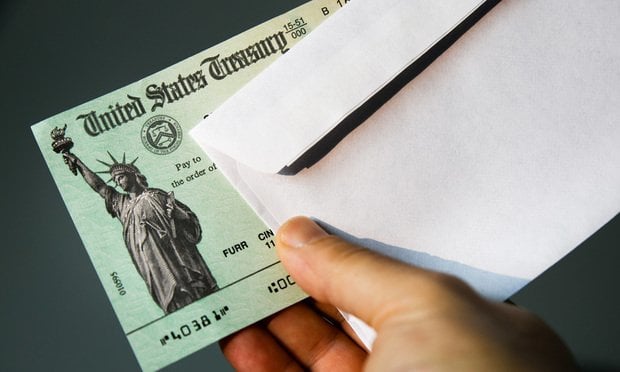 Photo: Jason Raff/Adobe Stock
Photo: Jason Raff/Adobe Stock
Quick actions taken by Montana credit union employees helped law enforcement authorities arrest and later convict two men who were part of a far reaching and sophisticated U.S. Treasury check fraud scheme involving tens of millions of dollars coordinated by criminal groups throughout the nation, according to FBI investigators.
One of those men, Dyonte Scott, 24, of Chicago, was sentenced to five years and five months in federal prison last week after admitting he attempted to defraud credit unions in a scheme using stolen identities and a U.S. Treasury check, the U.S. Attorney’s office in Missoula, Mont., said. Scott pleaded guilty earlier this year to bank fraud, aggravated ID theft and possession of a stolen U.S. Treasury check. The other man, Lorenzo Botello was sentenced to 16 months in federal prison in October after he pleaded guilty to bank fraud and possession of a U.S. Treasury check.
Recommended For You
On Jan. 26, after getting a tip from a credit union employee, police arrested Botello at a Bozeman branch of the $194 million Sky Federal Credit Union, which led investigators to a hotel room where they found Scott. While police were about to arrest him, Scott ripped up a $949,390 U.S. Treasury check.
After opening or attempting to open business accounts at the Bozeman branches of the $496 million Valley Credit Union, the $382 million Rocky Mountain Credit Union and Sky FCU, Scott and Botello had planned to deposit the real but stolen $949,390 U.S. Treasury check. While he was in jail awaiting his court proceedings, Scott directed others to delete evidence to obstruct the investigation, according to federal investigators.
Before Botello was arrested at Sky FCU, he attempted to open a business account at Valley CU on Jan. 24, but employees suspected one of his documents was possibly fake. They declined to open the account and called federal investigators. The next day, through Valley CU’s cooperation with federal investigators, employees attempted to lure Botello back to the branch so that local police could identify him, but that effort failed.
But on Jan. 26, a Valley CU employee alerted police that Botello was opening an account at Sky FCU where he was arrested.
According to a criminal complaint filed by federal investigators in this case, much of this fraud scheme in Montana is connected to a criminal organization operating out of Las Vegas. Scott and Botello also have been seen around the Rocky Mountain West states, including Wyoming, Idaho, Utah, Colorado and Nevada.
This sophisticated scheme begins when individuals steal U.S. Treasury checks.
“At this point, the theory is that an insider within the United States Post Office or within the United States Treasury/Bureau of Fiscal Service’s check processing center is fraudulently removing (stealing) U.S. Treasury checks,” according to the federal criminal complaint.
Most of the stolen checks are of large dollar amounts. After these checks are stolen, the criminal group will create fake Know Your Customer documents that are required to open a business account. The documents are typically corporate filings with a Secretary of State, an IRS employer identification number, and identification documents including a driver’s license and Social Security card along with proof of current address, which sometimes include corporate resolutions such as partnership agreements or corporate meeting minutes.
These stolen checks are then distributed --- or sold --- around the country. The specifics of how this is occurring is unknown. Evidence in other investigations, however, suggests at least one distribution method is through Telegram, federal investigators said.
Telegram is a freemium, cross platform, cloud-based instant messaging service, which is frequently used by criminals as a communication and marketplace platform because it provides encrypted video calling, VoIP, and file sharing.
The U.S. Treasury checks are then given to runners or mules such as Botello and Scott who travel the country to open a business bank account in the same name as the payee on the U.S. Treasury check.
When the runners go to financial institutions, they carry the Know Your Customer papers and other documents that correspond with the company needed to open a business account.
“It appears the criminal enterprise conducts research to determine the name and location of an actual officer or executive associated with the payee (business entity) on the U.S. Treasury check,” according to federal criminal complaint. “They will then generate a synthetic identification document (this seems to always be a driver’s license from the state where the U.S. Treasury check was addressed to) and match the name of an individual they have identified as associated with the business entity.”
What’s more, the address on the driver’s license is generally not a real house, but close to the location of the business address on the check and the photo on the driver’s license is the runner. Although the Social Security card does not have a legitimate number, the name matches the name on the fake driver’s license, and the Secretary of State documents will usually have an address from the local area of the targeted financial institution.
Federal investigators also noted the runner will have a corporate resolution that is signed by or references the name on the fake driver’s license. The runner also will have a utility bill that usually uses the local address on the Secretary of State documents.
© 2025 ALM Global, LLC, All Rights Reserved. Request academic re-use from www.copyright.com. All other uses, submit a request to [email protected]. For more information visit Asset & Logo Licensing.








